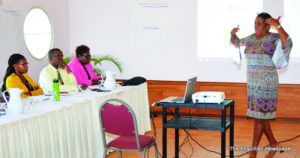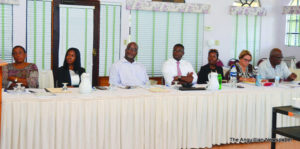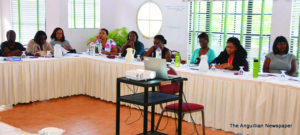
The Ministry of Social Development, in collaboration with the OECS and UNICEF, hosted a two-day forum on the Child Justice System in Anguilla — at the Paradise Cove on September 30th and October 1st. The facilitator was Mrs. Jacqueline Sealy-Burk of Grenada, assisted by Technical Officer in the OECS Juvenile Justice Reforms Ms. Gloria Augustus out of St. Lucia.
During an introduction to the forum, Anguilla’s Social Development Planner, Mrs. Kiesha Gumbs-Bibby, told the participants: “I welcome you all to this strategic planning session for the laws on Child Justice in Anguilla. I must give a warm welcome to our guests from overseas who will be our facilitators for the next couple of days. These are Technical Officer in the OECS Juvenile Justice Reform, Ms. Gloria Augustus, and Mrs. Jacqueline Sealy-Burk, Consultant on Child Justice Systems for OECS and UNICEF.”
Mrs. Sealy-Burk had visited Anguilla in 2016 and compiled what is called a “Country Report” on child justice systems in Anguilla, similar to what she would have generated for all of the OECS member states.
As facilitator of the 2-day forum, Mrs. Sealy-Burk’s objective was to sensitize the participants on the need for Anguilla to move on towards expediting 21st century legislation for the protection of children in a society where the rights and freedoms of children must be regarded and upheld, in accordance with the Convention on the rights of the Child. As a supplement to her lectures at the forum, her 82 page “Country Report” was utilized to show the importance of protecting children in Anguilla.
Mrs. Sealy-Burk stated: “Governments across the Caribbean, including the OECS region, have undoubtedly stepped up their efforts to improve State responses to child protection, both for children who are at risk of harm, as well as those who have come into conflict with the law. All Caribbean countries have ratified the Convention of the Rights of the Child (CRC) and, more recently, several governments have passed laws, developed policies and, in some instances they have drawn up plans of action for protecting children against abuse, neglect and exploitation.”
Mrs. Sealy-Burk elaborated on a vivid hindrance that exists across the spectrum of the OECS. She observed that one of the greatest problems with regard to child protection was the lack of information. Such information was not provided on an accurate and timely basis. She noted that data gathered from individual countries of the OECS, unfortunately, contained a great deal of gaps, thus making it difficult to produce reliable statistics on critical areas of child protection in the region at large.
She observed specifically: “In order to develop the evidence base and advocate for the strengthening of national child protection systems, governments and their partners require accurate regular and up-to-date data and information on how such systems are functioning. The lack of regularly collected and analyzed data on child protection systems across the region is notable, and the information that is gathered is often not validated.”
With regard to Anguilla, Mrs. Sealy-Burk’s report stated that the law reform process was very slow, but calculated: “The Anguilla law reform experience is a slow, yet well considered process. The sluggish pace of the law reform agenda in Anguilla is concerning, and has undeniably compromised the overall success of the national child protection and juvenile justice systems. However, it is important to note that Anguilla’s slow law reform has its unique advantages, paving the way for a process that demonstrates well considered and potentially enhanced legislative frameworks.
“The research in Anguilla revealed that the legislative reform agenda was delayed largely as a result of the fact that the Drafting Department within the AG’s Chambers is not moving as swiftly as expected. The slow pace was explained in terms of a shortage of staff, and the fact that the Bills are not assigned to anyone who could assume exclusive responsibility for drafting them.”
In closing out her thorough assessment of Anguilla’s slow moving law reform experience for child protection, Mrs. Sealy-Burk remarked: “Perhaps the best circumstance for Anguilla in moving forward, with the remainder of the Bills, is one that strikes a balance between the inordinate delay experienced to date and the effort made to perfect the Model Bills. The Model Bills should serve as a meaningful guide, and deviation from existing provisions should only be contemplated if they can be sufficiently rationalized. This approach will expedite law reform, while encouraging national review and input.”
– Staff Reporter, James R. Harrigan









